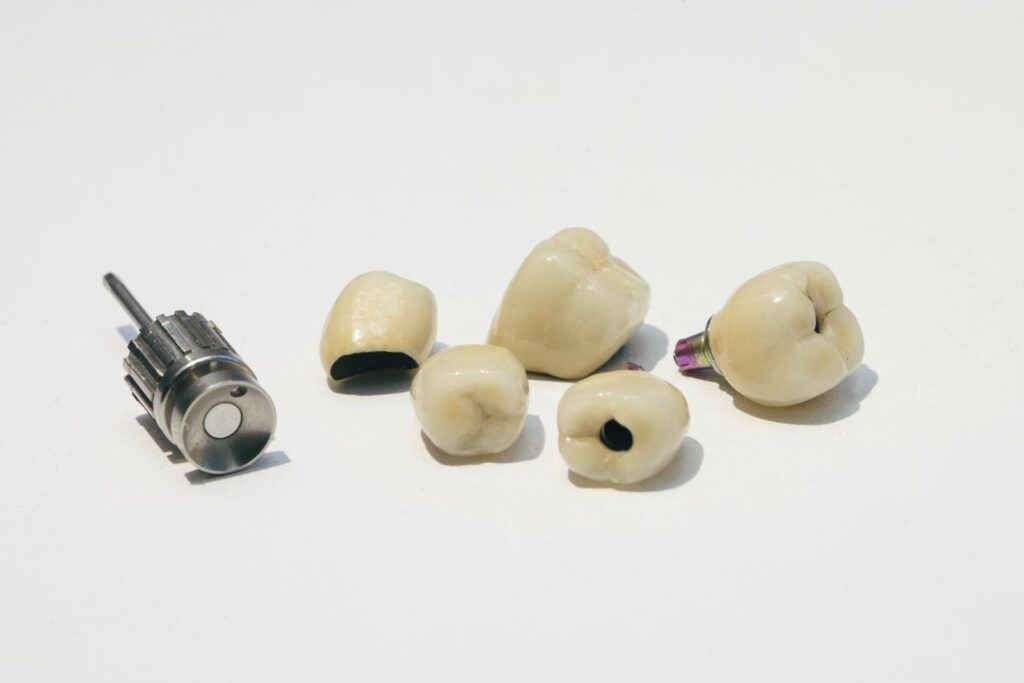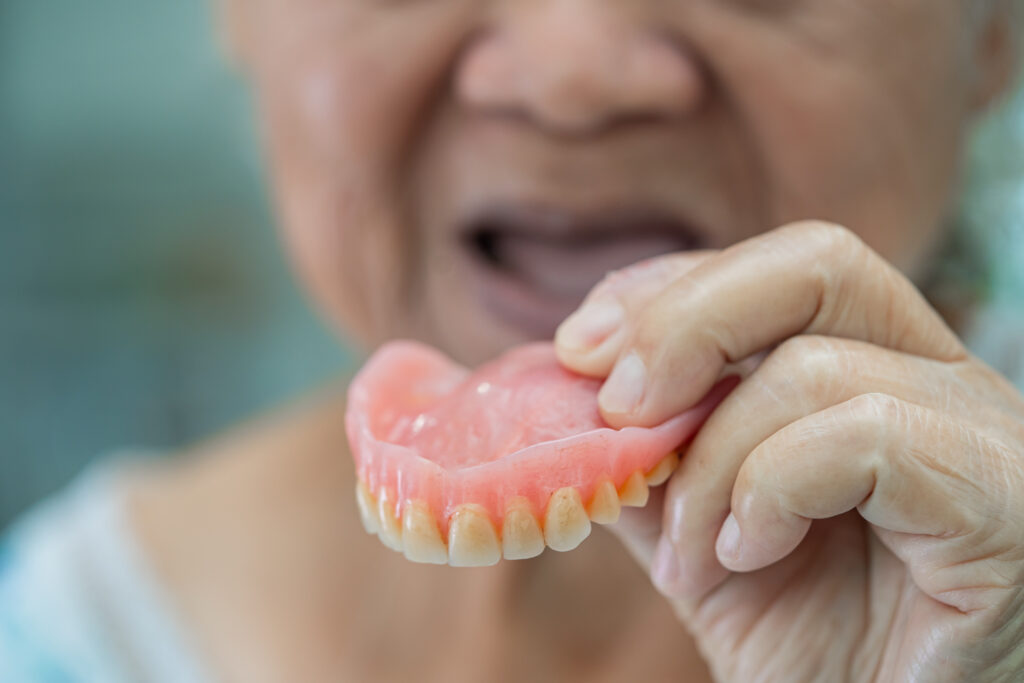When it comes to replacing missing teeth and restoring your smile, the choices can seem overwhelming. Two popular options are dental implants and traditional dentures.
Each has its unique benefits, and understanding these can help you make a well-informed decision about your dental health.
At Ashbourne Road Dental, we understand the significance of this choice and are here to guide you through it. So, in this article, we’ll explore the differences between these two procedures.
From the basics of how they work to their long-term impacts on oral health, we’ll cover everything you need to know. Remember, a confident smile starts with an informed decision!
Dental implants are a revolutionary solution in modern dentistry, offering a permanent fix for missing teeth. They consist of titanium posts that are surgically implanted into the jawbone, acting as artificial roots.
Over time, these posts fuse with the bone, providing a stable foundation for replacement teeth. One interesting thing about implants is that they don’t just replace the tooth; they replicate the root, offering a natural look and feel.

Dental implants bring a multitude of benefits, making them a highly sought-after solution for tooth replacement. Here’s a closer look at the advantages they offer:
One of the most significant benefits of implants is their ability to mimic natural teeth. From the way they look to the feel in your mouth, implants are almost like natural teeth. This gives a boost in confidence, as they seamlessly blend with your smile.
With implants, you regain almost full chewing power. They allow you to enjoy your favourite foods without the worry of slipping or discomfort that sometimes comes with dentures. This restoration of normal eating habits can significantly improve your overall quality of life.
Tooth implants are good at helping to preserve and stimulate natural bone growth. This is crucial, as tooth loss can lead to bone loss in the jaw. The implant post integrates with your jawbone, helping to keep it healthy and intact.
By filling the gap left by a lost tooth, dental implants may prevent the shifting of adjacent teeth. This helps maintain alignment and avoids potential issues that can arise from teeth moving into the empty space, thus preserving your bite and jaw health.
Beyond the physical benefits, dental implants in Ashbourne can dramatically enhance your quality of life. They eliminate the discomfort and insecurity often associated with removable dentures, such as slipping or clicking sounds.
With implants, you can speak, laugh, and eat without worry, allowing for a more active, confident, and enjoyable lifestyle.
Dentures are a traditional and widely-used solution for lost teeth, offering a removable option for those not suited for dental implants. That means you can easily take them out for cleaning and maintenance.
They come in two main types: complete and partial dentures. The first are for those who have lost all their teeth while the partial ones are for those missing just a few teeth.
Made from a combination of metal and acrylic, they are custom-fitted to sit comfortably in the mouth, resting on the gums. While they may not offer the same natural feel or stability as dental implants, they are an accessible and cost-effective option for many.

Dentures stand out as a highly affordable option for tooth replacement. They provide a practical solution for those seeking to address lost teeth without the higher cost typically associated with implant treatment. This makes them an accessible choice for a wide range of budgets.
One of their appealing aspects is their non-invasive nature. Unlike dental implants, which require surgery, they do not involve any surgical procedures. This can be particularly attractive for those who are not candidates for surgery or prefer to avoid it.
They offer the convenience of being easily removable, which makes cleaning them a straightforward process.
However, this investment can be cost-effective in the long run, considering their durability and minimal maintenance requirements.
The need for replacement or significant maintenance is considerably less frequent, making them a potentially more economical choice in the long term.

Choosing between the two is a decision that hinges on your specific needs, lifestyle, and overall oral health.
Each option has its unique benefits, and the right choice varies from person to person. Some may value the permanence and natural feel of implants, while others might prioritize the simplicity and non-invasive nature of dentures.
To make an informed decision, we invite you to schedule an appointment with us at Ashbourne Road Dental. Our team of professional dentists is well-equipped and experienced in both procedures, ensuring you receive the best care tailored to your needs.
By choosing us, you’re not just getting a dental procedure; you’re stepping towards a future with a confident, healthy smile. It doesn’t matter which of the procedures you opt for, you can be sure you are in the best hands for the best results.
The procedure for implants involves surgery and is performed under anesthesia, so you shouldn’t feel pain during the procedure. Post-surgery, there might be some discomfort, but it’s typically manageable with prescribed pain relief and aftercare instructions.
Yes, modern ones are designed to look very natural. They are custom-made to match your natural teeth in colour and shape, making them hardly noticeable.
With proper oral hygiene and regular dental check-ups, implants can last a lifetime. They are designed to be a durable and long-term solution for tooth replacement so far you know your way around implant maintenance.
Most adults in good general health and have healthy teeth are suitable candidates for tooth implants. However, certain conditions, like uncontrolled diabetes, heavy smoking, or severe jawbone loss, may affect eligibility. A thorough evaluation by a dental implant specialist is necessary to determine suitability.
Yes! Especially during the initial phase, you may need to avoid hard, sticky, or chewy foods as they can cause discomfort and dislodge the cases. Over time, you’ll learn what foods you can comfortably eat.
There may be an adjustment period where speech is slightly affected, as your mouth gets used to the dentures or implants. However, most people quickly adapt, and speech returns to normal.
The dental implant healing process is known as osseointegration, and it involves the implant fusing with the jawbone, which typically takes several months. During this time, it’s crucial to maintain good oral hygiene and follow your dentist’s instructions. Mild discomfort, swelling, and bruising are normal in the initial days post-surgery but generally subside quickly.
Yes, temporary dental implants do exist. These are typically used as a part of the dental restoration process, serving as a temporary solution while waiting for the permanent implant to fully integrate with the jawbone. Once the permanent implant is ready and the area is fully healed, the temporary implant is replaced with the permanent one.


Proudly serving patients throughout Derby, Derbyshire private and NHS.

“A fantastic experience from start to finish. The service has always been friendly, personal and efficient, from those in reception...”
“Absolutely amazing. I have never been more at ease with a dental procedure. I have autism and ADHD and have...”
“Best dentist I’ve been to! The staff are all so friendly and welcoming. Lovely new waiting room. Went for a...”
“Compelled to give this practice another 5 stars after, once again, fantastic service. I had dental pain whilst on holiday,...”
“Brilliant service, top quality. The hygiene and, specifically, the cleanliness is excellent. I was made to feel comfortable and at...”
“A fantastic experience from start to finish. The service has always been friendly, personal and efficient, from those in reception...”
“Absolutely amazing. I have never been more at ease with a dental procedure. I have autism and ADHD and have...”
“Best dentist I’ve been to! The staff are all so friendly and welcoming. Lovely new waiting room. Went for a...”
“Compelled to give this practice another 5 stars after, once again, fantastic service. I had dental pain whilst on holiday,...”
“Brilliant service, top quality. The hygiene and, specifically, the cleanliness is excellent. I was made to feel comfortable and at...”
“A fantastic experience from start to finish. The service has always been friendly, personal and efficient, from those in reception...”
“Absolutely amazing. I have never been more at ease with a dental procedure. I have autism and ADHD and have...”
“A fantastic experience from start to finish. The service has always been friendly, personal and efficient, from those in reception...”
“Absolutely amazing. I have never been more at ease with a dental procedure. I have autism and ADHD and have...”
“Best dentist I’ve been to! The staff are all so friendly and welcoming. Lovely new waiting room. Went for a...”
“Compelled to give this practice another 5 stars after, once again, fantastic service. I had dental pain whilst on holiday,...”
“Brilliant service, top quality. The hygiene and, specifically, the cleanliness is excellent. I was made to feel comfortable and at...”
“A fantastic experience from start to finish. The service has always been friendly, personal and efficient, from those in reception...”
“Absolutely amazing. I have never been more at ease with a dental procedure. I have autism and ADHD and have...”
“Best dentist I’ve been to! The staff are all so friendly and welcoming. Lovely new waiting room. Went for a...”
“Compelled to give this practice another 5 stars after, once again, fantastic service. I had dental pain whilst on holiday,...”
“Brilliant service, top quality. The hygiene and, specifically, the cleanliness is excellent. I was made to feel comfortable and at...”
“A fantastic experience from start to finish. The service has always been friendly, personal and efficient, from those in reception...”
“Absolutely amazing. I have never been more at ease with a dental procedure. I have autism and ADHD and have...”





















 so friendly and helpful!Relaxed atmosphere, I’m quite a nervous patient so this was very welcoming.Thanks guys
so friendly and helpful!Relaxed atmosphere, I’m quite a nervous patient so this was very welcoming.Thanks guys 








We need your consent before you can continue on our website. You can find more information about the use of your data in our privacy policy.
You can find more information about the use of your data in our privacy policy. Here you will find an overview of all cookies used. You can give your consent to whole categories or display further information and select certain cookies.